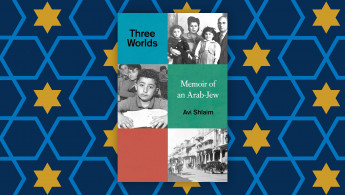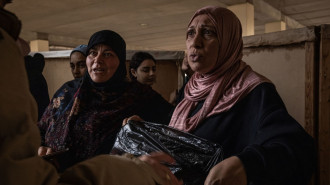Avi Shlaim's memoir 'Three Worlds': Mossad, Mizrahim, and the loss of Iraqi Jewry
“In Israel, my mother reminisced nostalgically about the wonderful Muslim friends we had in Baghdad and the happy times we spent with them,” writes Avi Shlaim in his new book Three Worlds: Memoirs of an Arab-Jew.
His mother’s fondness for Iraq was similarly matched by her aloofness for Israel, “One day I asked her whether we had any Zionist friends [while in Iraq]. My question took her by surprise. ‘No!’ she replied emphatically. ‘Zionism is an Ashkenazi thing. It had nothing to do with us.’”
The loss of Iraq was a hugely traumatic event for Iraqi Jewry, two and half millennia stretching back to the Babylonians ended within a short time span.
"On the one hand, Avi Shlaim seeks to contribute to the historical record of the Iraqi Jewish community. On the other hand, he wants to delve into the private world of his family. Three Worlds is highly readable, and engaging and will trigger more discussion"
As Shlaim argues, Baghdadi Jews were deeply integrated and intertwined with Iraqi society, and few dreamed of leaving the place, least of all for Israel.
Much of the memoir focuses on two broad areas, the meaning of the loss and trying to understand what happened in Iraq, as told through the prism of Shlaim’s family.
The reader is greeted with a deeply moving portrait of a community and Shlaim’s personal attempt to make sense of his own family. Fragmented memories and trying to piece together his family’s history, made harder by the fact Shlaim’s father passed away in the 1970s, Three Worlds takes us on an intimate journey.
|
Three Worlds has sparked a lot of controversy because of a key claim the memoir makes, which is the Israeli Mossad is responsible for a spate of bombings in Baghdad targeting the Jewish community.
The attacks were a key reason why so many Jews left Iraq, by 1953, 7,000 Jews out of 135,000 remained in Iraq. The majority left between 1950 to 1951 when the attacks happened.
The traditional Zionist account states the bombings were orchestrated by Iraqi Muslim radicals, who were motivated by deep-seated anti-semitism rooted in Islam, and the attacks were just yet another example of the long history of the persecution of Jews worldwide.
Claims the bombings were carried out by Israel have long existed as a rumour among Iraqi Jewish exiles as Abbas Shiblak outlines in his book Iraqi Jews: A History, Iraq itself prosecuted Jewish individuals for the crime- but Israel has long denied it.
Between April 1950 to May 1951, there were 7 explosions the most serious being the Masouda Shem-Tov Synagogue attack in which 3 to 4 died. Shlaim spent decades trying to get to the bottom of what happened in the 1950s, his attempts to get documents from the Israeli archives on the bombings were routinely denied.
However, in 2017, Shlaim stumbled upon new information which he deems credible proof that the Mossad l’Aliyah Bet (the Mossad unit involved with smuggling Jews out of other countries) were behind the bombings.
The first breakthrough was a family friend disclosing his past in the Zionist underground in Iraq who knew those behind the bombing campaign personally and the second was a letter containing a Iraqi police report into the underground’s activities.
The key motive driving Israel was not to kill anyone but to frighten the Iraqi Jews into leaving and they were concerned that few seemed interested in coming to the Jewish state. Three Worlds zooms in on 5 attacks and Shlaim says, “Three of the five bombs were the work of the Zionist underground in Baghdad.”
The man responsible for these 3 bombings, according to the evidence Shlaim presents, was Yusef Ibrahim Basri, a 28-year-old Baghdadi Jew and lawyer. Basri was convicted and executed in Iraq for his role in the attacks- he was recruited by Mossad in 1949 after Basri moved to Israel and was sent back to Iraq to spy, Shlaim says. The family friend details to Shlaim how Basri was recruited and how Mossad set up training camps in Iraq and Iran for members of the underground.
|
The only attack Shlaim does not think the Zionist underground was responsible for was the synagogue attack, which his source says a Syrian-Muslim was behind after some Jewish acquaintances reported him to the police after he tried to defraud them.
The source also alleged that the Syrian did not act alone and was tasked to do it by an Iraqi police officer who was bribed by Israel. Shlaim doesn’t think this particular claim is credible and cites other sources which show the synagogue attack was likely carried out by an Iraqi radical nationalist movement.
Shlaim treats all claims with scepticism, “I am a historian, not a conspiracy theorist," he writes, checks and tries to verify everything he is told and the book turns from a memoir into a detective story.
Three Worlds offers a charming, deeply personal and reflective look at the past. By his own admission, Shlaim tries to detach himself from his subject, but one gets the sense that in Three Worlds being detached is easier said than done.
Delving into the stories of his mother and her unwanted marriage to his father as well as the meaning of the loss of Iraq- the impression the reader is left with is the sense Shlaim is opening himself up more than he usually would.
We learn more about the world that shaped the man. I do not mean to suggest this means Three Worlds has no objective value or facts give way to narrative, as is often the case with memoirs, on the contrary, I think the book is trying to do two things at once.
On the one hand, Avi Shlaim seeks to contribute to the historical record of the Iraqi Jewish community. On the other hand, he wants to delve into the private world of his family. Three Worlds is highly readable, engaging and will trigger more discussion.
Usman Butt is a multimedia television researcher, filmmaker and writer based in London. Usman read International Relations and Arabic Language at the University of Westminster and completed a Master of Arts in Palestine Studies at the University of Exeter.
Follow him on Twitter: @TheUsmanButt

![Palestinians mourned the victims of an Israeli strike on Deir al-Balah [Getty]](/sites/default/files/styles/image_684x385/public/2024-11/GettyImages-2182362043.jpg?h=199d8c1f&itok=xSHZFbmc)


![The law could be enforced against teachers without prior notice [Getty]](/sites/default/files/styles/image_684x385/public/2178740715.jpeg?h=a5f2f23a&itok=hnqrCS4x)
 Follow the Middle East's top stories in English at The New Arab on Google News
Follow the Middle East's top stories in English at The New Arab on Google News


